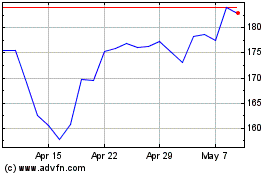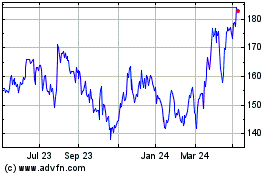By Benjamin Katz
LONDON -- British Airways and Virgin Atlantic Airways Ltd. are
pushing for the establishment of a travel corridor between the U.K.
and U.S. without requirements for expensive Covid-19 tests and
quarantines on both sides of the Atlantic, as carriers here try to
capitalize on a robust vaccination drive and falling coronavirus
cases.
Contrasting that optimism, Air France-KLM Group said it won
approval for another large government-financed lifeline as it faces
months of reduced traffic amid soaring infections and slow
vaccination efforts across continental Europe.
The diverging tacks highlight how a resumption of air travel is
moving at significantly different speeds around the world. In the
U.S., airlines are gearing up for a busy summer amid a relatively
smooth vaccination drive across the country in recent months.
Chinese travelers returned to airports in droves late last year,
though traffic fell again at the start of the year as Covid-19
cases picked up in some parts of the country.
Travel between countries, meanwhile, has remained largely
grounded amid a wide array of country-specific travel restrictions.
That has hampered European carriers, dependent on international
service.
"Large domestic markets are doing great," said Alex Irving, an
aviation analyst at Bernstein. "Of course, Europe doesn't have
that. Ultimately it depends on vaccine rollouts when governments
will be comfortable unlocking their borders."
The U.K. government could be a test case. It is preparing to
disclose details of plans to allow residents to fly internationally
as early as next month. Speaking to reporters Tuesday, aviation
executives in the U.K. pointed to new guidance from the U.S.
Centers for Disease Control and Prevention saying fully vaccinated
travelers can fly again with low risk to themselves and others.
In the U.S., discussions are also under way to determine what
conditions are necessary for lifting restrictions on international
travel, according to people familiar with the matter.
The industry has floated the idea of easing U.S.-U.K. travel
requirements before, but vaccine success on both sides of the
Atlantic has emboldened them to push harder now.
Executives are also pushing the U.K. government to move quickly
on detailing which overseas air markets will get the green light
for service, saying they need time to prepare facilities, return
parked aircraft to service and bring back furloughed staff. British
Airways Chief Executive Sean Doyle warned the U.K. government not
to "waste the opportunity of having had an incredibly successful
vaccine rollout." British Airways is a unit of International
Consolidated Airlines Group SA.
U.K. airlines hope an accelerating recovery in the U.S., led by
domestic travel, bodes well for a pickup in international demand.
Both Delta Air Lines Inc. and United Airlines Holdings Inc. have
said they may have stopped bleeding cash last month, and in
mid-March U.S. airports posted their busiest weekend since March
2020.
Anticipating a surge in travel, U.S. airlines in recent weeks
announced plans to fly more than 150 new domestic routes. Delta
also said it would stop blocking the middle seat on its flights
from May 1, while United is restarting its pilot recruitment
programs. Discount operators Frontier Group Holdings Inc. and Sun
Country Airlines Holdings Inc. have raised hundreds of million of
dollars in separate initial public offerings as they look to ride a
surge in passenger travel heading into the summer.
On continental Europe, however, new Covid-19 cases are soaring
in places. Major travel markets like Germany and France have fallen
behind in vaccinations, and governments have reimposed lockdowns
and other pandemic restrictions.
Discounters Ryanair Holdings PLC and Hungary-based Wizz Air
Holdings PLC, both heavily dependent on cross-border European
flights, said demand remained depressed in March amid the rise in
infections across the continent. Ryanair, Europe's biggest airline
by passengers, said it flew just 500,000 passengers in March, a 95%
decline from last year, while Wizz recorded a 73% drop to 480,200
travelers.
Ryanair is planning to operate at about 15% of its April 2019
capacity this month, according to aviation data firm OAG. Michael
O'Leary, the Dublin-based carrier's chief executive, said last week
he expects vaccination numbers to continue to rise in Portugal,
Spain and Italy, setting a path for a jump in travel as early as
this summer.
Air France-KLM said it was being hit by the "surge in the third
wave of the pandemic in several European countries" and expects
losses in the current quarter to reach 750 million euros,
equivalent to $888 million. The company posted a loss of EUR1.7
billion for its most recent fiscal year.
It is still hopeful of a recovery in the summer, expecting that
vaccination campaigns on the continent will speed up and lead to
less-stringent travel restrictions. Still, the airline said the
French government agreed to convert a shareholder loan of EUR3
billion issued last year into perpetual hybrid bonds in order to
recapitalize the carrier. The government will also participate in a
share capital increase to raise an additional EUR1 billion. The
Dutch government is in separate talks with KLM on a similar
recapitalization plan. The moves follow EUR10.4 billion in
liquidity provided to Air France-KLM since the start of the
pandemic.
Deutsche Lufthansa AG said it would seek shareholder approval
next month to raise EUR5.5 billion to help pay down some of the
EUR9 billion it received in bailouts from the German state last
year.
In China, where almost all foreign travel has been barred since
March 2020, domestic demand staged a recovery as airlines offered
cheap deals to encourage people to fly. Monthly passenger numbers
returned to pre-pandemic levels in September and in December were
10% higher than a year earlier, according to the Civil Aviation
Administration of China.
But that recovery has proven fragile. A Covid-19 outbreak early
this year centered on the northern city of Shijiazhuang disrupted
the traditionally busy Spring Festival period. That triggered tens
of millions of cancellations. Chinese airlines carried 8% fewer
passengers during the holiday season, from Jan. 28 to March 8,
compared with a year earlier, according to the civil aviation
administration.
Wholly reliant on cross-border travel, Hong Kong's aviation
sector remains largely grounded. Flagship carrier Cathay Pacific
Airways Ltd. reported that it transported only 21,134 passengers in
February, down 98% from a year earlier.
Alison Sider in Chicago and Trefor Moss in Shanghai contributed
to this article.
Write to Benjamin Katz at ben.katz@wsj.com
(END) Dow Jones Newswires
April 06, 2021 14:38 ET (18:38 GMT)
Copyright (c) 2021 Dow Jones & Company, Inc.
International Consolidat... (LSE:IAG)
Historical Stock Chart
From Mar 2024 to Apr 2024

International Consolidat... (LSE:IAG)
Historical Stock Chart
From Apr 2023 to Apr 2024
